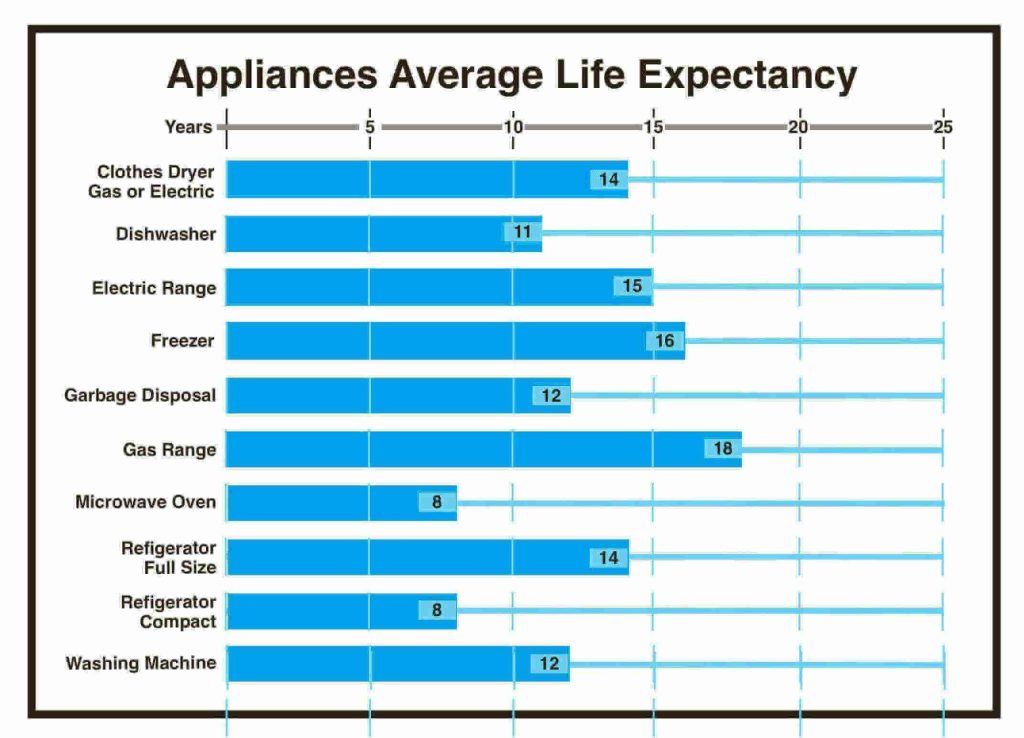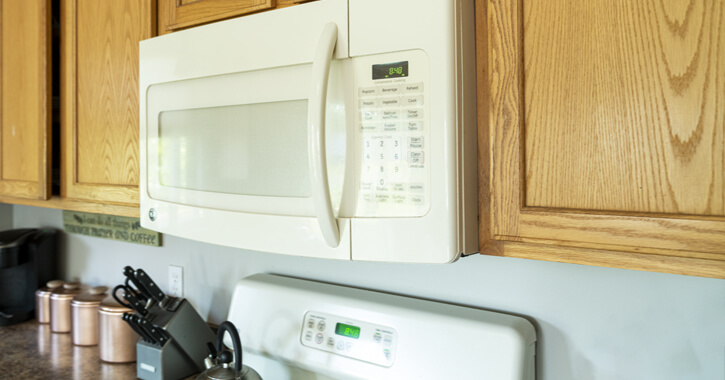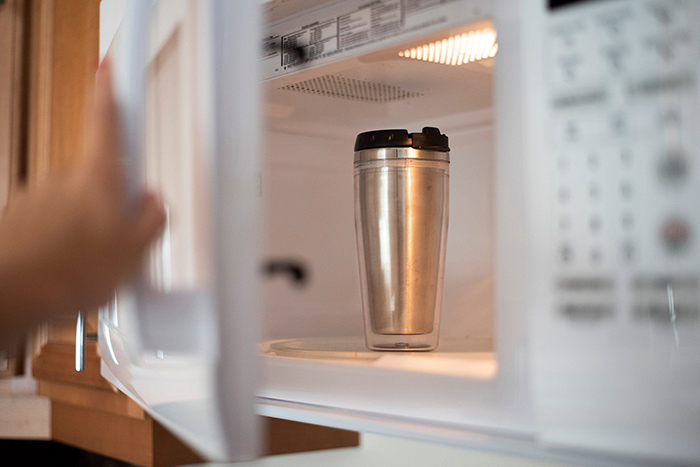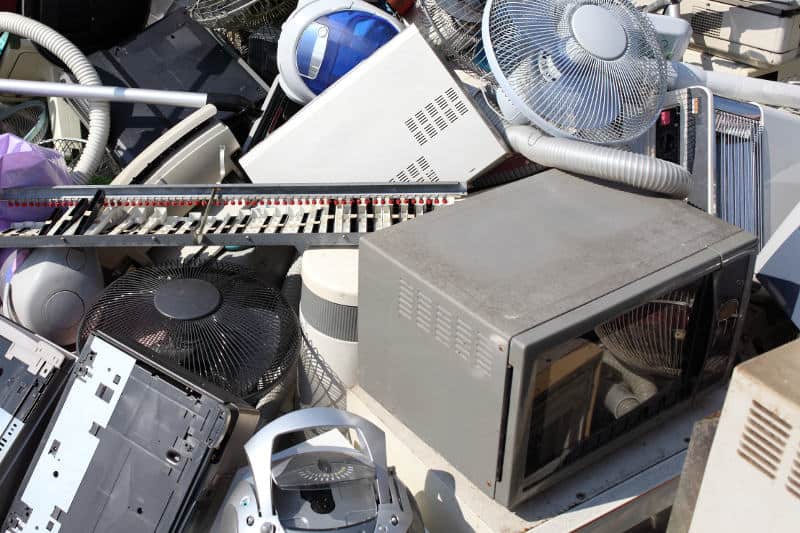Microwaves are one of the most commonly used appliances in homes across the world. According to the statistics, about 90% of American households own a microwave.
But how long do microwaves last? How do you know when it’s time to replace your microwave?
The average lifespan of a microwave is about 9 to 10 years. However, this number will differ based on the brand, model, and how often it is used.
For example, a higher-end microwave from a well-known brand is likely to last longer than a cheaper model from a less known brand.
Additionally, if you use your microwave multiple times a day, it will not last as long as if you only use it a couple times a week.
In this blog post, we will answer these questions and give you information about microwave lifespan.
We will also provide some tips on how to extend the life of your microwave, so you can be sure to get the most out of your appliance. So keep reading!
How Long Do Microwaves Last
The Average Lifespan Of Microwaves
When it comes to appliances, microwaves tend to have a pretty good lifespan. But, like all things, they eventually reach the end of their life and need to be replaced.
So, how long do microwaves last typically?
Most microwaves only last around 9 to 10 years before they need to be replaced. That’s not to say that all microwaves only last 10 years, but it’s definitely the average.
Of course, this can vary depending on the brand, model, and how often it’s used.
For example, a high-end microwave that’s used infrequently may last up to 15 years, while a lower-end model that’s used daily may only last 5 years.

So, while the average lifespan of a microwave is 9 years, yours could last anywhere from 5-10 years or more. If you take good care of it and don’t use it excessively, you could even get up to 15 years out of it.
There are a few things that can shorten a microwave’s lifespan, such as overloading it or using it to heat up greasy or oily food.
If you take good care of your microwave and use it as intended, it should last you a good long while.
10 years is the average, but there are always outliers. Some microwaves last much longer, while others only last a few years. It all depends on how you use and care for your microwave.
So, if your microwave is getting up there in age, don’t be too worried. It’s probably just time for an upgrade. And, who knows, the new model might even have some features that your old one didn’t have!
More Technical Microwave Knowledge To Read
Factors Affect The Lifespan Of Microwaves
The lifespan of a microwave can be affected by a number of factors, from the quality of the unit to how often it’s used. But with proper care, most microwaves can last for years, even decades.

There are several factors that can affect the lifespan of a microwave, such as:
The Quality of the Unit
When it comes to appliances, you usually get what you pay for. That’s why it’s important to invest in a high-quality microwave.
Cheap, poorly made units are more likely to break down and need to be replaced sooner. Spend a little extra to get a well-made, durable microwave and it will pay off in the long run.
How Often It’s Used
How often you use your microwave also plays a role in how long it lasts
If you use your microwave several times a day, it will naturally have a shorter lifespan than one that’s only used occasionally.
That’s because more frequent use puts more wear and tear on the appliance. If you want your microwave to last, try to use it only when necessary.
The Type of Use
Not all uses for a microwave are created equal. Heating up a cup of coffee or a frozen meal is much less demanding on the appliance than, say, cooking a Thanksgiving turkey.
If you’re planning to use your microwave for heavy-duty tasks, look for a unit that’s designed to handle that type of use.
Care and Maintenance
How well you take care of your microwave also affects its lifespan. If you clean it regularly and don’t overload it, it’s going to last longer than if you let it get dirty and never clean it.
Even the best-made, most expensive microwave won’t last long if it’s not properly cared for. Be sure to clean the unit regularly, both inside and out.
And if something does break, don’t try to fix it yourself. Call a professional to handle any repairs.
So, if you want your microwave to last as long as possible, buy a high-end model from a reputable brand and take good care of it.
And, if you use it multiple times per day, consider getting two so you can rotate them and give each one a break.
While the average lifespan of a microwave is 10 years, there are several factors that can affect this.
The brand, model, usage, and care all play a role in how long do microwaves lasts. So, if you want yours to last as long as possible, keep these factors in mind.
You’re Shortening the Life of Your Microwave By…
While the average lifespan of a microwave is 9 to 10 years, there are several things you can do that will shorten its life.
If you’re doing any of the following, you’re likely reducing the amount of time your microwave will last.
1. Overloading the microwave
One of the quickest ways to shorten the lifespan of your microwave is by overloading it.
Every time you try to cook too much food at once, you’re putting stress on the appliance and wearing it down. This can shorten the life of your microwave and even cause it to catch fire.
To avoid this, make sure you only cook small amounts at a time. If you’re cooking for a large group, cook in batches instead of all at once.
2. Using the wrong type of cookware

Another common mistake people make is using the wrong type of cookware in their microwaves. Some materials, like aluminum foil, can cause sparks and even fires.
To avoid this, only use cookware that is specifically designed for use in microwaves. If you’re not sure if something is safe, check the manufacturer’s instructions or do a quick internet search.
3. Not cleaning it regularly
If you don’t clean your microwave regularly, you’re shortening its lifespan. Food particles and grease can build up on the interior of the unit and cause damage.
Even if you only use it for heating up food, food particles can build up and cause problems.
To avoid this, make sure to clean your microwave at least once a week. You can use a microwave-safe cleaning solution or just a damp cloth.
So, be sure to clean your microwave regularly, both inside and out.
4. Using it for everything
While microwaves are great for heating up food, they’re not designed to be used for everything. For example, you should never put metal in a microwave, as it can cause sparks and even fires.
To avoid this, only use your microwave for its intended purpose – heating up food. If you need to heat up something in a hurry, there are other methods that are safer, such as using a stovetop or oven.
5. Slamming the door
Slamming the door of your microwave is one of the quickest ways to shorten its lifespan.
Every time you do it, you’re putting stress on the hinges and wearing them down. So, if you want your microwave to last, be sure to close the door gently.
6. Running it while it’s empty
Running your microwave while it’s empty is a bad idea because it can cause damage to the appliance. So, if you want to prolong the life of your microwave, only run it when there’s food in it.
7. Not giving it space
Another common mistake people make is not giving their microwave enough space. If you don’t have enough clearance around it, the heat can’t circulate properly and it can cause damage to the unit.
To avoid this, make sure there’s at least 3 inches of space on all sides of your microwave. And, if possible, keep it away from heat sources, such as stoves and ovens.
8. Forgetting to use the ventilation fan
If your microwave has a ventilation fan, be sure to use it when cooking. The fan helps to circulate the air and keep the appliance from overloading.
To use the fan, simply turn it on before you start cooking. And, if your microwave doesn’t have a fan, be sure to open the door periodically to let the heat escape.
9. Leaving it on 24/7
If you leave your microwave on all the time, you’re shortening its lifespan.
Even when you’re not using it, the appliance is working hard to keep food warm. So, if you want your microwave to last, be sure to turn it off when you’re not using it.
10. Not following the manufacturer’s instructions
If you don’t follow the manufacturer’s instructions, you could be shortening the life of your microwave. Every model is different, so it’s important to read the manual before using it.
If you don’t follow the instructions, you could damage your microwave or even cause it to catch fire. So, take the time to read the instructions before using your microwave.
By following these tips, you can prolong the life of your microwave and keep it working properly for years to come.
Tips To Lengthen a Microwave’s Lifespan
Here are some tips to help you get the most out of your microwave and keep it running for as long as possible.
1️⃣ Use it regularly
One of the best ways to keep your microwave running efficiently is to use it regularly.
This helps to prevent the build-up of dirt and grime, which can cause the microwave to overheat and eventually break down.
If you only use your microwave occasionally, it’s a good idea to give it a good clean every few months to keep it in top condition.
2️⃣ Avoid overheating
Microwaves can overheat if they’re used too often or for too long at a time. This can damage the internal components and shorten the lifespan of the appliance.
If you notice that your microwave is starting to overheat, it’s best to stop using it and allow it to cool down before using it again.
3️⃣ Don’t use it for everything
Microwaves are great for reheating food and drinks, but they’re not designed for cooking from scratch.
Using your microwave to cook food can cause it to overheat and break down prematurely.
If you want to cook food in your microwave, it’s best to invest in a microwave-safe cooking bag or container.
4️⃣ Keep it clean

One of the best ways to keep your microwave running efficiently is to keep it clean. Dirt and grime can build up on the interior surfaces, causing the microwave to overheat and eventually break down.
It’s important to clean your microwave regularly, both inside and out. Use a damp cloth or sponge to wipe down the interior surfaces, and use a mild detergent to clean the exterior.
5️⃣ Be careful with what you put in it
Microwaves can be damaged by certain materials, so it’s important to be careful with what you put in them.
Avoid using metal containers, as they can cause sparks that can damage the microwave. If you’re reheating food in a plastic container, make sure that it’s microwave-safe.
6️⃣ Don’t overdo it
Using your microwave too much can shorten its lifespan. If you find that you’re using it multiple times a day, it’s best to invest in a second appliance.
This will help to prolong the lifespan of your microwave and keep it running efficiently for many years to come.
By following these tips, you can help to prolong the life of your microwave. Just remember to use it safely and carefully, and you’ll be able to enjoy its convenience for years to come.
Signs You Need to Repair or Replace Your Microwave
Here are some signs that you may need to repair or replace your microwave:
1. It’s not heating food properly
If your microwave isn’t heating food properly, it could be due to a faulty heating element.
This is one of the most common problems with microwaves, and it can usually be fixed with a simple repair.
2. The door isn’t closing properly
If the door on your microwave isn’t closing properly, it could be due to a misaligned hinge.
This is an easy problem to fix, but if the door is severely damaged, you may need to replace it.
3. It’s making strange noises
If your microwave is making strange noises, it could be due to a problem with the fan or the motor.
These problems can usually be fixed with a simple repair, but if the damage is severe, you may need to replace the appliance.
4. It’s making smoke, sparks, and burning smells.
Smoke, sparks, and burning smells are all signs that your microwave is in need of repair or replacement.
If you see any of these signs, it’s important to stop using the appliance immediately and call a professional for help.
5. It’s not turning on
If your microwave won’t turn on, it could be due to a faulty switch or fuse. These problems are easy to fix, but if the damage is severe, you may need to replace the appliance.
6. The display is blank
If the display on your microwave is blank, it could be due to a problem with the power supply.
This is an easy problem to fix, but if the damage is severe, you may need to replace the appliance.
7. It’s over 10 years old
Microwaves typically have a lifespan of 10-12 years. If yours is starting to show its age, it may be time to start shopping for a new one.
If you’re experiencing any of these problems with your microwave, it’s best to call a professional for help. They’ll be able to diagnose the problem and recommend the best course of action.
Repair Or Replace: When Is It The Right Choice For You?
If your microwave is starting to show its age, you may be wondering if it’s time to repair or replace it.

There are a few things to consider when deciding whether to repair or replace your microwave. These include the cost of repairs, the severity of the problem, and the age of the appliance.
Here are a few things to consider when making your decision:
1. The cost of repairs
If the cost of repairs is more than half the price of a new microwave, it’s probably time to start shopping for a new one.
2. The severity of the problem
If the problem with your microwave is severe, such as smoke or sparks coming from the appliance, it’s best to replace it.
3. The age of the microwave
As mentioned earlier, microwaves typically have a lifespan of 10-12 years. If yours is nearing the end of its life, it may be time to start shopping for a new one.
If you’re still not sure whether to repair or replace your microwave, it’s best to call a professional for help.
They’ll be able to diagnose the problem and recommend the best course of action.
Microwave Repair Cost
The cost of repairing a microwave can vary depending on the severity of the problem. For example, a simple repair like replacing a fuse will cost much less than replacing the entire appliance.
Here are some average costs of common microwave repairs:
| Replacing a fuse | $10-$20 |
| Replacing the door | $50-$100 |
| Replacing the heating element | $30-$60 |
| Replacing the power supply | $40-$80 |
If you’re experiencing any problems with your microwave, it’s best to call a professional for help.
Microwave Replace Cost
The cost of replacing a microwave can vary depending on the size and features of the new appliance. For example, a basic microwave will cost less than a high-end model with all the bells and whistles.
Here are some average costs of common microwaves:
| Basic microwave | $50-$100 |
| High-end microwave | $500-$1,000 |
If you’re in the market for a new microwave, it’s best to compare prices and features before making your purchase.
How To Dispose Of An Old Microwave Safely
When your microwave starts to show its age, it may be time to start thinking about how to dispose of it safely.
If you’re not sure what to do with your old appliance, here are a few tips on how to get rid of a microwave oven:

1️⃣ Check with your local recycling center. Many centers will accept microwaves for recycling. This is often the easiest and most environmentally-friendly option for disposing of an old microwave.
2️⃣ Donate your microwave to a local charity or thrift store. If your appliance is still in good working condition, someone else may be able to put it to good use.
3️⃣ Sell your microwave online or at a garage sale. This is another option if your appliance is still in good condition.
4️⃣ Contact your local waste disposal company. In some cases, you may be able to have your microwave picked up as part of your regular trash service.
5️⃣ Take your microwave to a landfill or dump. This should be a last resort option, as microwaves can take up valuable space in landfills.
When disposing of a microwave oven, be sure to follow all local laws and regulations. This will help ensure that your old appliance is disposed of properly and safely.
If you’ve decided to replace your old microwave, it’s important to dispose of it safely. Microwaves contain harmful chemicals that can be released into the environment if they’re not disposed of properly.
FAQs
When should you replace your microwave?
There is no definitive answer to this question, as the lifespan of a microwave depends on a number of factors, including how often it is used, what type of foods are cooked in it, and whether or not it is properly maintained.
However, most experts agree that microwaves should be replaced every five to seven years. If your microwave is starting to show signs of wear and tear, or if it is no longer cooking food evenly, it may be time to invest in a new one.
Do microwaves last forever?
No, microwaves do not last forever. The lifespan of a microwave depends on a number of factors, including how often it is used, what type of foods are cooked in it, and whether or not it is properly maintained.
How long do commercial microwaves last?
The average lifespan of a commercial microwave is about 6 to 10 years. However, this range can differ based on the brand, model, and frequency of use.
For example, a high-end commercial microwave may last up to 15 years, while a lower-end model may only last for 5 years.
How long do over-the-range microwaves last?
The average lifespan of an over-the-range microwave is about 8 to 10 years. However, this range can differ based on the brand, model, and frequency of use.
For example, a high-end over-the-range microwave may last up to 15 years, while a lower-end model may only last for 5 years.
How long do built-in microwaves last?
The average lifespan of a built-in microwave is about 9 to 11 years. However, this range can differ based on the brand, model, and frequency of use.
With proper care and maintenance, your microwave can last for many years.
How long does a microwave magnetron last?
A magnetron is the part of the microwave that produces the microwaves that heat your food. The average lifespan of a magnetron is about 2 to 6 years.
However, this range can differ based on the brand, model, and frequency of use.
How long does a microwave turntable last?
The average lifespan of a microwave turntable is about 5 to 7 years. However, this range can differ based on the brand, model, and frequency of use.
Is it worth fixing a microwave?
It depends. If your microwave is fairly new and the repair is not too expensive, it may be worth fixing.
However, if your microwave is old or the repair is expensive, you may be better off buying a new one.
Should I replace my 20-year-old microwave?
Yes, you should replace your 20-year-old microwave. The average lifespan of a microwave is about 6 to 10 years, so your 20-year-old microwave is well past its expiration date.
Can a damaged microwave harm you?
A damaged microwave can emit harmful radiation. If you are exposed to this radiation, it can lead to burns, cancer, and other health problems.
Summary
Microwaves are an important part of many people’s lives. They provide a quick and easy way to cook food.
However, like all appliances, microwaves have a limited lifespan. It is important to know how long do microwaves last so that you can plan for when it needs to be replaced.
The average lifespan of a microwave is 9-10 years. If your microwave is over 10 years old, it may be time to start shopping for a new one. The longevity of your microwave will depend on how well you maintain it.
Our tips should give you a good idea of what to do to keep your microwave lasting as long as possible.
We hope you found this article helpful. If you have any questions or need help troubleshooting, feel free to reach out to us. We’re always happy to help our customers extend the lifespan of their appliances! Thanks for reading!


